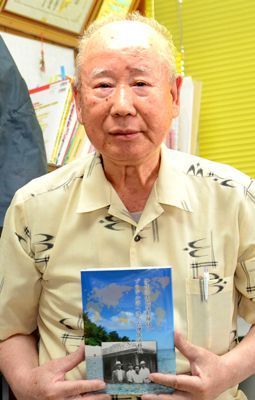Emigrant returns from Brazil after hardship: “Dreams do come true.”

Ansaburo Takushi, who recently published an autobiography, poses for a picture at Isa, Ginowan City, on April 24.
May 4, 2019 Ryukyu Shimpo
By Takaya Kinra
Isa, Ginowan City—Ansaburo Takushi, 76, emigrated to Brazil after the U.S. military seized his land, and later returned to Okinawa.
Takushi recently published an autobiography, titled “Ishihama Land Seizure and the Isahama Immigrants of Brazil.”
While the author often found himself at the mercy of the times, Takushi focused on his studies, and made a living for himself.
He looked back on his experience and said, “If you hold on tight and work hard, dreams will come true.”
He shares his story by giving away copies of his book to students in Okinawa of all ages, grade school through college.
Takushi was born in Isa, Ginowan City, in 1942.
The book incorporates photographs and his illustrations of the village layout, conveying the peaceful atmosphere of the time.
In 1955, during his first year in middle school, the U.S. military came with bayonets and bulldozers.
They seized land, which contained beautiful farm fields, and built Camp Zukeran (present-day Camp Foster).
Following the Ryukyu government’s recommendation, the local residents decided to emigrate to Brazil.
Takushi, who had begun his last year of middle school, moved to Brazil in 1957 with his parents.
He worked on a coffee farm as a day laborer, but wages were low.
Working conditions were so dreadful, his nose bled from the dust.
Takushi studied Portugese at the local school, and when he finally started adjusting to his new life, his home was burglarized. Furthermore, Brazil was experiencing a severe inflation at the time, and so his parents decided to return to Okinawa.
Out of the Isahama emigrants, the Takushis was the only family to return home.
He was hopeful when he left for Brazil, but returning to Okinawa in 1965 as a 23-year-old, he was anxious about starting a new life from scratch, and “couldn’t stop crying.”
There were embarrassing moments as well.
When Takushi took an entrance exam for a technical school alongside middle school students, a proctor, not realizing Takushi was an examinee, told him to “get out.”
Nonetheless, Takushi said he studied “as if my life depended on it,” and became a certified electrician, as he had aspired.
He worked while finishing school, and eventually set up an architectural design office, and a law firm.
Takushi said, “I want people to know that there are simple men like me out there, who have managed to navigate life.”
You can request a copy of his book by mail. Call Takushi at 098-898-5716 for inquiries.
(English translation by T&CT and Monica Shingaki)
Previous Article:71 unused U.S. blank cartridges found on returned NTA land, reminders of military presence
Next Article:Woman who survived the war and postwar eras performs “kajimaya” celebration for 97 years of life in Zamami, an island of 600
[Similar Articles]
- Himeyuri students publish new book telling the invisible wounds of the war
- Twenty-nine haiku stone tables placed on Izena Island
- Free Ie Beef for high school students from neighboring islands
- Farm shop opens with 250 varieties of hibiscus flowers
- AmerAsian School in Okinawa marks 15th anniversary of establishment
 Webcam(Kokusai Street)
Webcam(Kokusai Street)


